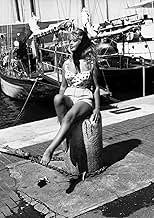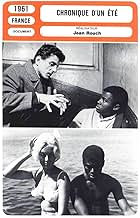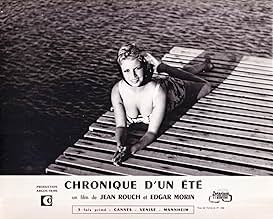AVALIAÇÃO DA IMDb
7,5/10
3,9 mil
SUA AVALIAÇÃO
Um documentário sobre a vida cotidiana de parisienses comuns, feito no estilo cinéma vérité.Um documentário sobre a vida cotidiana de parisienses comuns, feito no estilo cinéma vérité.Um documentário sobre a vida cotidiana de parisienses comuns, feito no estilo cinéma vérité.
- Prêmios
- 1 vitória no total
Marceline Loridan Ivens
- Self
- (as Marceline)
Marilù Parolini
- Self
- (as Mary Lou)
Jean-Pierre Sergent
- Self
- (as Jean-Pierre)
Jacques Gautrat
- Self - un ouvrier
- (as Jacques)
Régis Debray
- Self - un étudiant
- (as Régis)
Nadine Ballot
- Self
- (as Nadine)
Modeste Landry
- Self - un étudiant africain
- (as Landry)
Jacques Gabillon
- Self - un employé
- (as Jacques)
Simone Gabillon
- Self - une employée
- (as Simone)
Avaliações em destaque
Some really fascinating stuff pops up in here with pertinent questions that make you wonder how much was real vs performance. Overall a neat look at 1960 Paris that holds time capsule like qualities and the keys to shared traits cross generations.
This film, made in the summer of 1960 by the sociologist Edgar Morin and the ethnographer Jean Rouch, aimed to be as 'true as a documentary, but with the content of a fiction film.' Facilitated by improved technology (16mm film, sync sound, light hand held cameras) it pioneered a direct or live aesthetic dubbed 'cinema verite'. It was to film 'true life', but engage on a subjective level, getting people to talk about their experiences and ambitions, and most notably, whether or not they are happy. What emerges is an absolutely overwhelming cinematic experience, a film that is deeply affecting but also that makes you think. The film begins with a market researcher, Marceline, on the street, asking people whether or not they are happy. This sequence seems to me both to confirm the importance of human relationships and point up the dissatisfaction that living in a society about to tip into consumerism engenders. The film then moves to concentrate on a set of characters. Morin was criticised for his structural approach, typing his characters (i.e. a factory worker, a petit bourgeois, a student), but a real sense of the individuals involved shines through, notably in the sequences with Angelo and Landry chatting, and Marceline recounting her experience of deportation during the war. The most revolutionary part of this film is that the makers demonstrate the impossibility of documentary objectivity when they film themselves filming - they show how the truth of the film is constructed. Questions of authenticity abound. At the end of the film, they screen it to the characters involved. Even those filmed are unable to decide whether they were acting ('hamming for the camera') or being themselves. Morin and Rouch conclude they have failed in their aim to offer a slice of life, as the very act of filming something transforms it. Truth is elusive in the attempt to represent the everyday. This film is far from a failure however - watch it and be blown away.
Often cited as one of the greatest documentaries ever made Jean Rouch and Edgar Morin's "Chronicles of a Summer" takes a look at the lives of of ordinary Parisiennes over the course of the summer of 1960. It was filmed in a 'cinema vertie' style, using the people who appear as if they were actors 'acting out' their lives. There is no voice-over; their technique is to use interviews or simply silently film these people going about their business. What distinguishes this extraordinary film from others of its kind is that this is a work both sociological and deeply political, a piece of social history in which Africans are side-lined and homosexuality never mentioned.
Rouch and Morin pick and choose their subjects, mostly workers, students and intellectuals, and back them into a corner where the politics of the proletariat becomes the benchmark. These people talk fearlessly about their treatment by the State and the drugery of their daily routine with white Parisiennes oblivious to their inherent racism.
The film-makers fundamental question is, 'Are you happy?' Initially two women interview people on the street asking them if they are happy and as the film progresses this becomes its focal point while the level of intimacy Rouch and Morin achieves is extraordinary. Theirs is a technique other film-makers have used many times since, perhaps more skillfully as film-making has become more sophisticated but this masterpiece remains the granddaddy of them all. Unmissable.
Rouch and Morin pick and choose their subjects, mostly workers, students and intellectuals, and back them into a corner where the politics of the proletariat becomes the benchmark. These people talk fearlessly about their treatment by the State and the drugery of their daily routine with white Parisiennes oblivious to their inherent racism.
The film-makers fundamental question is, 'Are you happy?' Initially two women interview people on the street asking them if they are happy and as the film progresses this becomes its focal point while the level of intimacy Rouch and Morin achieves is extraordinary. Theirs is a technique other film-makers have used many times since, perhaps more skillfully as film-making has become more sophisticated but this masterpiece remains the granddaddy of them all. Unmissable.
"Chronicle of A Summer" invented the cinema verité movement, the idea being that by celebrating and revealing the artificial nature of the film-making process, the truth, or more accurately, some truths will emerge. The film is enveloped with a luminous and appealing humanism, and it is a very cool and cinematic portrait of Paris in the beat days. Remember that World War Two was only a decade or so before this and somehow the fog of that war hangs over the film, especially given the backstory of one of the participants, at least this is what I remember..As historic documents go, it is also amazingly compelling today. I find the film much more absorbing than "Salesman" or Drew Associates stuff. Drink espresso instead of a pint before the film, my friend and you'll be fine..
JB-81
PS If you want to watch paint dry, check out Melville- Although he's pretty great too..
JB-81
PS If you want to watch paint dry, check out Melville- Although he's pretty great too..
Dugan McShain Anthropological Film Chronicle of a summer Chronique d'un été
Filmmaker Jean Rouch, in coordination with sociologist Edgar Morin, create a story out of seemingly random interviews and anecdotes. Together they create a piece that describes life in Paris circa 1961, they converse with their friends and associates about life, the current war in Algeria, and the mindset of the daily life of Parisians. Using the newly available 16mm camera they set out to do what no one had done before them: try and capture daily life and discuss it. They talk at length about politics, arguing on film, and discuss, both during the film and at the end when the filmmakers show their finished work to the participants and have them dissect it.
They give feedback, feelings and talk about the characters, describing what worked and didn't, what felt real and what seemed contrived. The people that they interview are across the board when looked at socioeconomically, intellectually, and racially, providing alternate views about the problems faced, the stories that they needed to tell to the camera and the trials that were associated with their lives.
I was, to say the least disappointed with the final product that was shown. As I was watching the film there came a scene where the two filmmakers are discussing their participation and the feat that they had just accomplished with the finished film ready to be shown. It was a very intimate scene where it seemed as if both of the filmmakers were unaware that they were being filmed and as such proceeded to expound on the principles, and the theory of making an anthropological film.
It was half way through this conversation that I realized that they staged this discussion not as a candid frank debate but as a 'realistic end cap' to put on their film to add flair and realism. What seemed at first as a novel approach to film-making came off more as a clever marketing ploy, using the audience as a sounding board, and bringing the audience closer to the subject matter of the film through the use of intimacy.
The filmmakers opted for participation in the film instead of the typical vein of anonymity. Reflexivity is a device that is used to vary the distance from a subject, giving the idea that the filmmakers, the product and everything that goes along with it a unity in the production. This style is self-serving in that the filmmakers could be seen prompting the subjects and providing a direct line of questions that they could use to form a solid piece. In the court of law this is called 'leading the witness' in order to get the desired answers that you seek, as opposed to the answers that come naturally from a subject matter that is brought up.
Rouch gives specific questions that lend themselves to specific answers. "I would argue that most anthropologists implicitly believe content should so dominate form in scientific writing that the form and style of an ethnography appears to "naturally" flow out from the content." - (Ruby, Studies in the anthropology of Visual Communication, Pg 106,Vol. 2, No. 2, Fall 1975). In providing specific questions, they do not let the life naturally 'flow' but instead impede it at their own will destroying the illusion that they have created. These filmmakers seem almost like they wish to participate in the very spectacle they wish to show, and cannot distance themselves from the subjects for fear of losing notoriety.
Morin and Rouch are extremely open to their subjects, providing valuable insight into their minds, as well as the minds of the people whom they are interviewing. This certainly provides for honesty in front of the camera creating a cushion of comfort for the subjects so that the camera does not seem to interfere as much a simply record. In certain scenes it seemed as if we were an observer regarding these people with a cold unfeeling eye. The argument in the hallway for example. This does not lend itself to a self-conscious conversation.
There are moments in the film that do seem very contrived however. There is a scene of a woman walking through the streets of Paris along with her walking we hear her telling the story of her father's internment and her own in a Nazi death camp. This is obviously a scripted scene. It lends itself to disbelief when we see that she is walking, lost in thought. The technique of us hearing those thoughts is vital to this disbelief.
The film-making was excellent at times, as I said, giving the sensation of an omniscient- floating eyeball, observing the people at their daily lives. This feeling is ruined however when we are privy to the Rouch's and Morin's conversation on what they feel the outcome of the film represents. It creates a feeling of false voyeurism then, incompatible with the sensitive proximity that we have just watched. The scene in the theater when he shows the characters dissecting each other is especially grating as it lends it self even more to a Dali-esquire surrealism where the characters are watching themselves as we watch them.
Filmmaker Jean Rouch, in coordination with sociologist Edgar Morin, create a story out of seemingly random interviews and anecdotes. Together they create a piece that describes life in Paris circa 1961, they converse with their friends and associates about life, the current war in Algeria, and the mindset of the daily life of Parisians. Using the newly available 16mm camera they set out to do what no one had done before them: try and capture daily life and discuss it. They talk at length about politics, arguing on film, and discuss, both during the film and at the end when the filmmakers show their finished work to the participants and have them dissect it.
They give feedback, feelings and talk about the characters, describing what worked and didn't, what felt real and what seemed contrived. The people that they interview are across the board when looked at socioeconomically, intellectually, and racially, providing alternate views about the problems faced, the stories that they needed to tell to the camera and the trials that were associated with their lives.
I was, to say the least disappointed with the final product that was shown. As I was watching the film there came a scene where the two filmmakers are discussing their participation and the feat that they had just accomplished with the finished film ready to be shown. It was a very intimate scene where it seemed as if both of the filmmakers were unaware that they were being filmed and as such proceeded to expound on the principles, and the theory of making an anthropological film.
It was half way through this conversation that I realized that they staged this discussion not as a candid frank debate but as a 'realistic end cap' to put on their film to add flair and realism. What seemed at first as a novel approach to film-making came off more as a clever marketing ploy, using the audience as a sounding board, and bringing the audience closer to the subject matter of the film through the use of intimacy.
The filmmakers opted for participation in the film instead of the typical vein of anonymity. Reflexivity is a device that is used to vary the distance from a subject, giving the idea that the filmmakers, the product and everything that goes along with it a unity in the production. This style is self-serving in that the filmmakers could be seen prompting the subjects and providing a direct line of questions that they could use to form a solid piece. In the court of law this is called 'leading the witness' in order to get the desired answers that you seek, as opposed to the answers that come naturally from a subject matter that is brought up.
Rouch gives specific questions that lend themselves to specific answers. "I would argue that most anthropologists implicitly believe content should so dominate form in scientific writing that the form and style of an ethnography appears to "naturally" flow out from the content." - (Ruby, Studies in the anthropology of Visual Communication, Pg 106,Vol. 2, No. 2, Fall 1975). In providing specific questions, they do not let the life naturally 'flow' but instead impede it at their own will destroying the illusion that they have created. These filmmakers seem almost like they wish to participate in the very spectacle they wish to show, and cannot distance themselves from the subjects for fear of losing notoriety.
Morin and Rouch are extremely open to their subjects, providing valuable insight into their minds, as well as the minds of the people whom they are interviewing. This certainly provides for honesty in front of the camera creating a cushion of comfort for the subjects so that the camera does not seem to interfere as much a simply record. In certain scenes it seemed as if we were an observer regarding these people with a cold unfeeling eye. The argument in the hallway for example. This does not lend itself to a self-conscious conversation.
There are moments in the film that do seem very contrived however. There is a scene of a woman walking through the streets of Paris along with her walking we hear her telling the story of her father's internment and her own in a Nazi death camp. This is obviously a scripted scene. It lends itself to disbelief when we see that she is walking, lost in thought. The technique of us hearing those thoughts is vital to this disbelief.
The film-making was excellent at times, as I said, giving the sensation of an omniscient- floating eyeball, observing the people at their daily lives. This feeling is ruined however when we are privy to the Rouch's and Morin's conversation on what they feel the outcome of the film represents. It creates a feeling of false voyeurism then, incompatible with the sensitive proximity that we have just watched. The scene in the theater when he shows the characters dissecting each other is especially grating as it lends it self even more to a Dali-esquire surrealism where the characters are watching themselves as we watch them.
Você sabia?
- CuriosidadesThe 6th greatest documentary of all time according to the 'Sight & Sound' poll 2014. The list was compiled after polling from over 200 critics and curators and 100 filmmakers.
- Citações
Sophie - the cover-girl: People are bored everywhere now. But boredom comes from within. If you've got an inner life, you're never bored.
- ConexõesFeatured in Les échos du cinéma: Episode #1.23 (1961)
Principais escolhas
Faça login para avaliar e ver a lista de recomendações personalizadas
- How long is Chronicle of a Summer?Fornecido pela Alexa
Detalhes
- Tempo de duração1 hora 25 minutos
- Cor
- Mixagem de som
- Proporção
- 1.37 : 1
Contribua para esta página
Sugerir uma alteração ou adicionar conteúdo ausente

Principal brecha
By what name was Crônica de um Verão (1961) officially released in India in English?
Responda



























